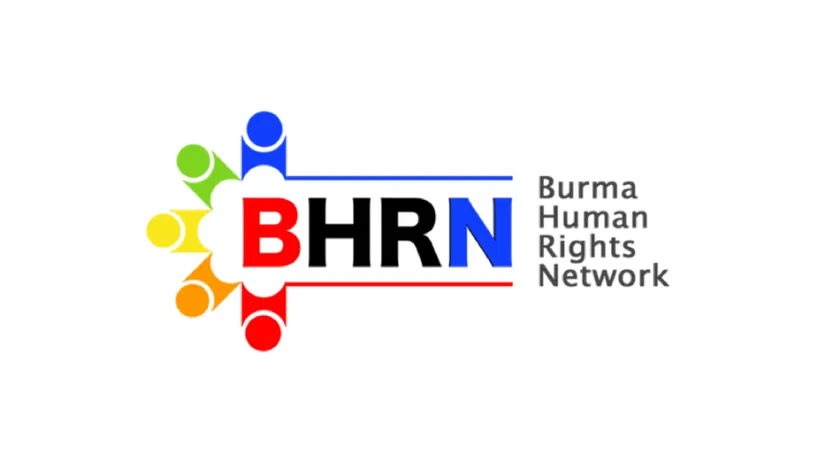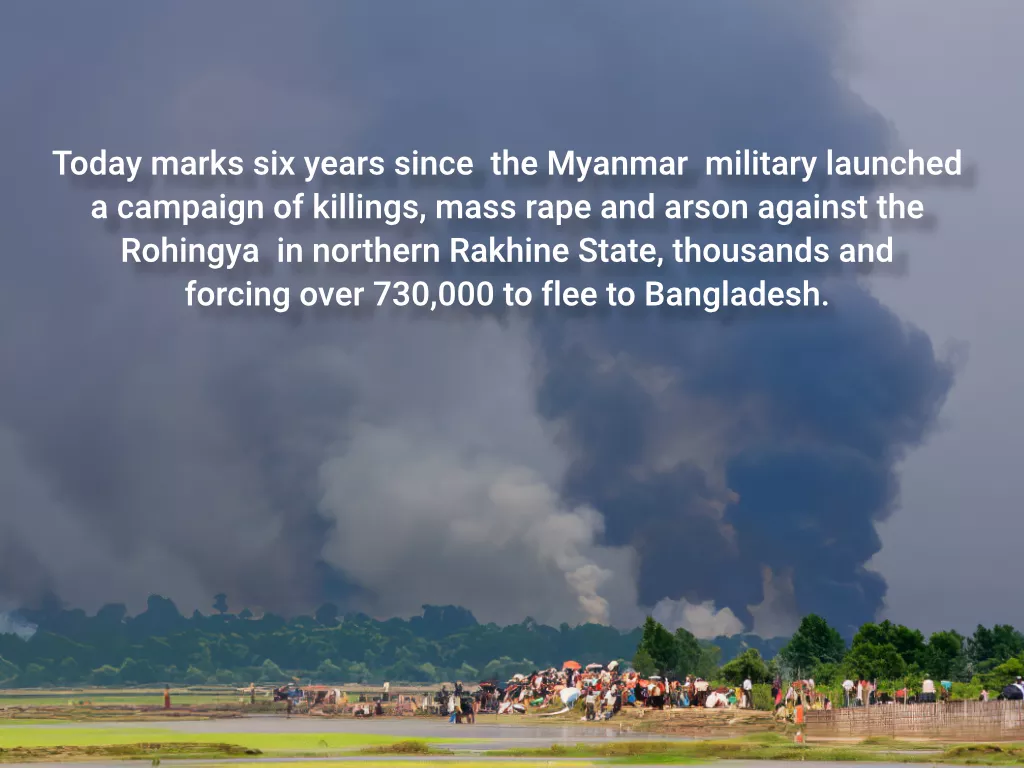The International Community Must Act Now to Stop the Ongoing Genocide of Rohingya and Other Muslim Minorities in Myanmar
25 August 2023


Today marks six years since the Myanmar military launched a campaign of killings, mass rape and arson against the Rohingya in northern Rakhine State, killing thousands and forcing over 730,000 to flee to Bangladesh. In the six years since the military’s atrocities, the situation for Rohingya in Myanmar and abroad, offers a dismal reflection of justice delayed.
In Myanmar, some 600,000 Rohingya remain trapped in internment camps in Rakhine state under a system of discriminatory laws and policies that amount to crimes against humanity and ongoing genocide. The junta continues to deny the Rohingya the ability to live free and dignified lives by further restricting their freedom of movement, livelihoods, and access to education.
“There are many avenues for the international community to cease the ongoing atrocities and hold the military junta accountable for the crimes against humanity and acts of genocide they continue to commit,” said Kyaw Win, Executive Director of the Burma Human Rights Network (BHRN). “It has been six years since the military’s campaign of murder, rape, and arson in Rakhine State. How much longer do the Rohingya have to wait for justice?”
Freedom of movement restrictions remains one of the main human rights concerns of the Rohingya. Between February 2021 until July 2023, the junta arrested and detained an estimated 3841 Rohingya for traveling outside their communities without getting prior permission. Those detained risk being subjected to torture and women and girls are at heightened risk of being subjected to sexual and gender-based violence while under detention. The junta’s ongoing efforts to restrict the movement of Rohingya are in clear violation of International Court of Justice (ICJ) provisional measures aimed at preventing genocidal acts against the Rohingya. The counter-memorial of the junta is due on August 24, 2023.
Furthermore, the junta and its supporters continue to use divisive and hateful rhetoric targeting non-Buddhist religious groups to divide the resistance and deflect and divert attention from the coup. While religious oppression has been a longstanding issue in Myanmar, the coup emboldened the junta to further persecute, marginalize, and incite violence against the Rohingya and other Muslim minorities throughout the country. From February 2021 until July 2023, BHRN documented at least 654 incidents of hate-speech targeting Muslim minorities including the Rohingya s by junta supporters on social media including Facebook, Telegram, and junta-backed journals.
In addition to physical attacks on the Rohingya and other Muslim minorities and their places of worship, this campaign is also being perpetrated through discriminatory laws, policies, and practices. At the union-level, the 1982 Citizenship Law of Myanmar remains as one of the main tools of Rohingya exclusion in the country. Rohingya are not recognized as one of the 135 officially recognized ethnic groups. Rohingya are, instead forced to go through the National Verification Card process that effectively categorizes them as foreigners.
Despite the longstanding evidence of widespread and systematic human rights violations, impunity remains nearly absolute. Impunity has been particularly enabled by the UN Security Council’s inaction on Myanmar, with Russia and China resisting any substantive action. Even in the face of serious violations of international law, the political dynamics of the Council has shielded Myanmar from any real consequences.
While the adoption of the long-overdue Chapter VI resolution by the UN Security Council was a welcome step, it failed to include substantive measures to refer Myanmar to the International Criminal Court (ICC), to impose a global arms embargo, and targeted sanctions to cut revenue to the junta. The demands put forward in the resolution including an immediate end to all forms of violence, the release of political prisoners, and the need for unimpeded humanitarian access are critically important but do not include consequences for the junta’s failure to meet these demands and accountability for crimes the military has committed to date.
So long as the military enjoys complete impunity for their actions, unyielding oppression of the Rohingya and other minorities will continue unabated. The time to close this impunity gap is now. BHRN calls on:
• The UN Security Council to end its inaction and refer the situation in Myanmar to the ICC or establish a separate criminal tribunal to investigate and prosecute the full spectrum of atrocity crimes in Burma.
• UN member states to impose targeted economic sanctions against the Myanmar military, ensure effective implementation, and prosecute sanction breaches.
• UN member states and international companies to stop the supply and transfer of arms, including raw material, machinery, and technology, to the Myanmar military.
• UN member states to redouble their efforts to pursue international legal action against the junta, including by joining the Gambia’s case at the ICJ and by actively pursuing investigations and prosecutions under the principle of universal jurisdiction like those in Turkey, Argentina, and Germany.
• The International Criminal Court (ICC) to accept the National Unity Government’s declaration submitted to them in July 2021 to grant the ICC jurisdiction to address mass-atrocity crimes committed in Myanmar since 2002.
• Myanmar’s neighbouring states, including India, Thailand, Indonesia, Bangladesh, to devise a comprehensive regional response to the refugee crisis, provide protection, support, and humanitarian and legal aid to all refugees fleeing Myanmar, and to authorize emergency cross-border aid to internally displaced people in Myanmar.
Organisation’s Background
BHRN is based in London and operates across Burma/Myanmar working for human rights, minority rights and religious freedom in the country. BHRN has played a crucial role in advocating for human rights and religious freedom with politicians and world leaders.
Announcements
28 February 2025
Asian NGO Network on National Human Rights Institutions , CSO Working Group on Independent National Human Rights Institution (Burma/Myanmar)
Open letter: Removal of the membership of the dis-accredited Myanmar National Human Rights Commission from the Southeast Asia National Human Rights Institution Forum

Progressive Voice is a participatory rights-based policy research and advocacy organization rooted in civil society, that maintains strong networks and relationships with grassroots organizations and community-based organizations throughout Myanmar. It acts as a bridge to the international community and international policymakers by amplifying voices from the ground, and advocating for a rights-based policy narrative.